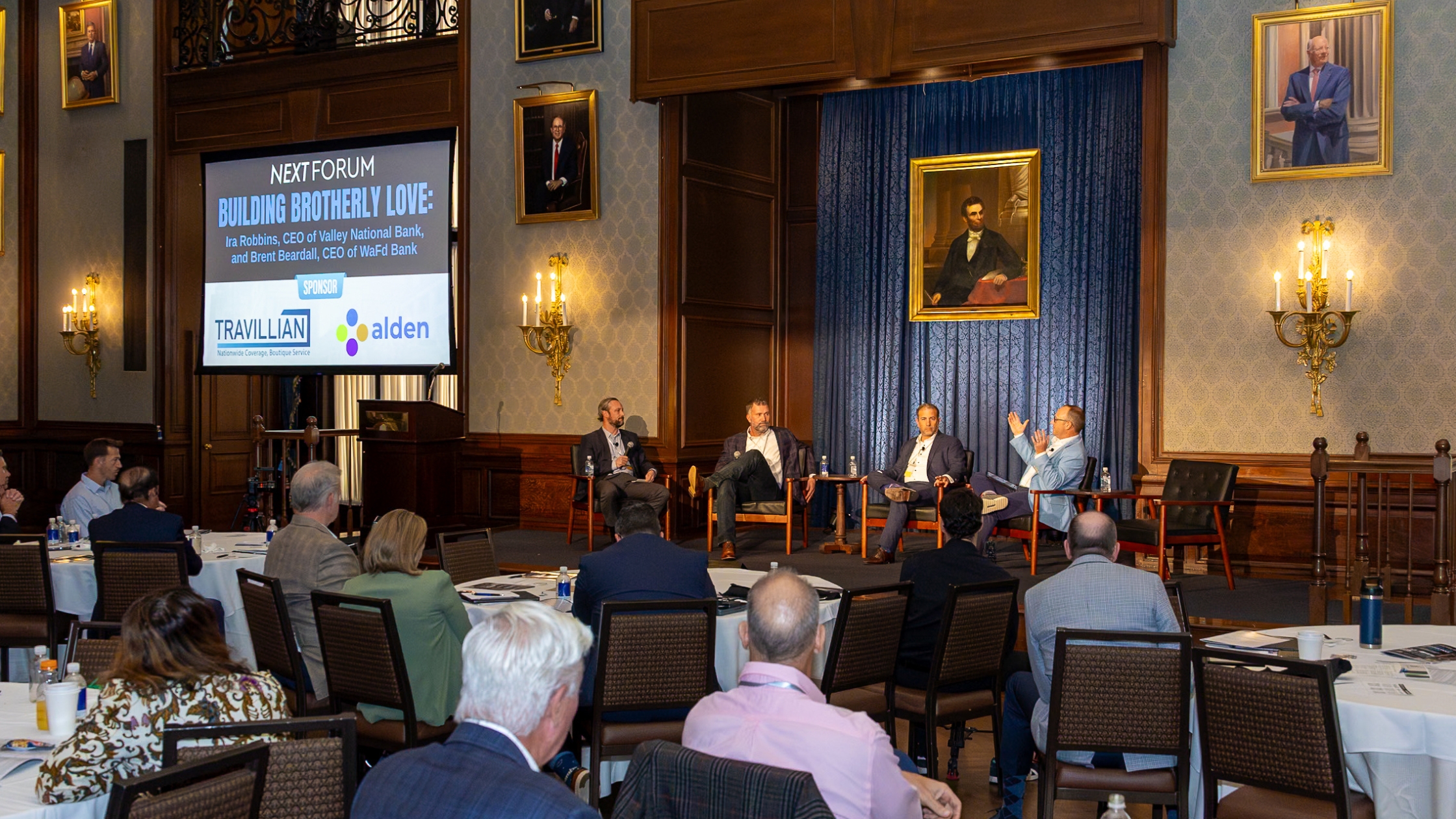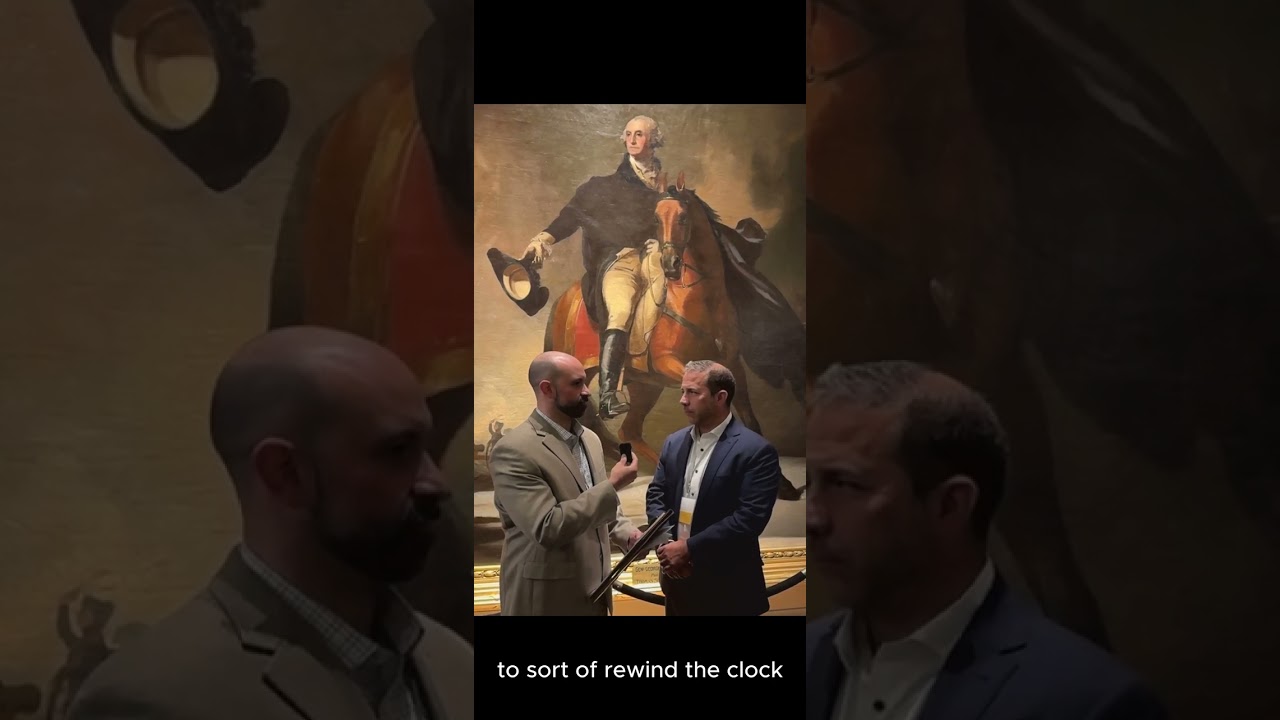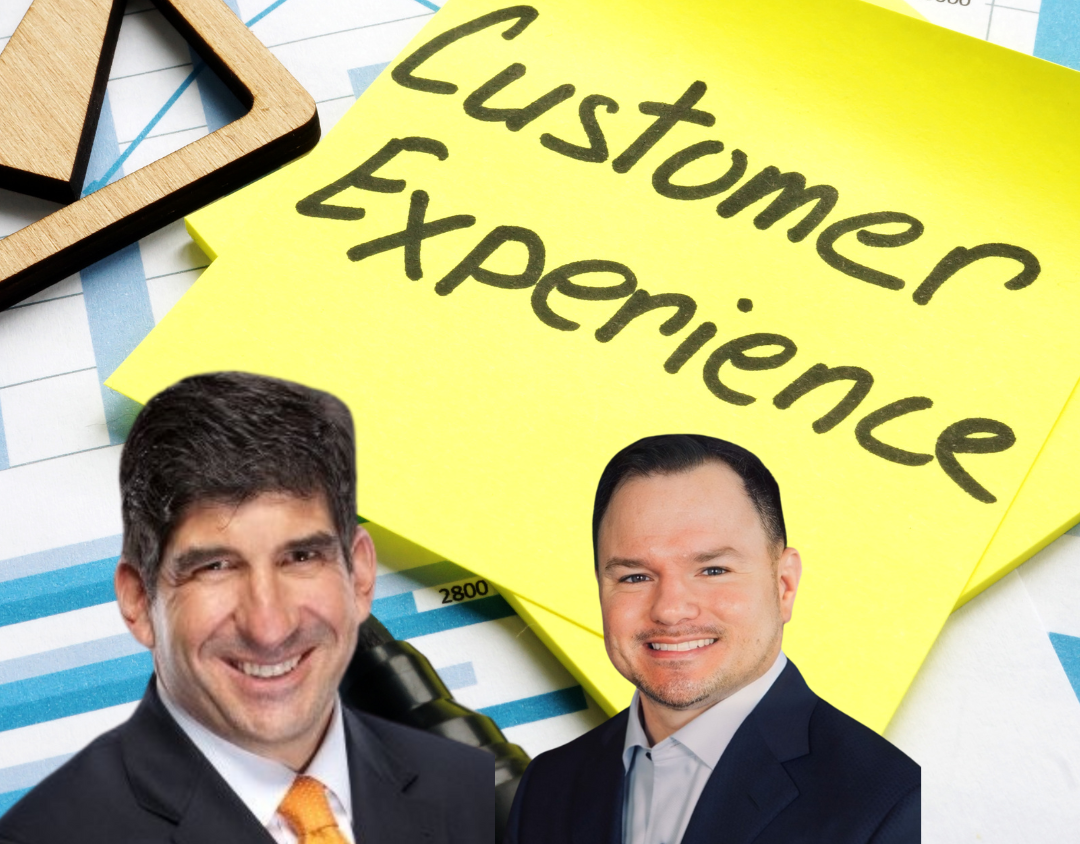Top Financial Insights for Community Bank Executive Strategies
Community bankers and financial leaders from across the nation gathered in Center City Philadelphia for banking’s latest day-long executive forum. Hosted by Travillian and Alden Investment Group, the dynamic event at the Philadelphia Union League was shaped by candid debate, actionable insight, and forward-looking strategies.
With a roster of industry experts, each session delivered practical counsel on topics ranging from regulatory turbulence and asset-liability management to the game-changing rise of artificial intelligence and the new realities of talent acquisition.
John Durso (Left) with Co-Keynote Speaker Ira Robbins, Valley Bank CEO (Right)
Banking in 2025: A Declaration of Independence
Moderated by Andrew Liesch of Travillian, the first panel — Gary Svec (Performance Trust), Steve Fusco (Spencer Savings Bank), and Joe Thomas (Freedom Bank) — agreed that Washington’s friendlier tone hasn’t yet translated to practical regulatory relief. “Four agencies are still speaking with four different voices,” said Thomas, highlighting the inconsistency that’s frustrating community banks. Fusco urged that “scale is essential for survival,” while Svec cautioned, “Efficiency ratios will determine the winners.”
The group saw artificial intelligence as both opportunity and risk: “AI is an efficiency tool — and if you have bad processes, it will just make bad decisions faster,” Fusco warned.
All agreed that recruiting and developing next-generation talent — and being proactive about succession — is what will set sustainable banks apart, with Svec concluding that “deliberate, proactive development” is now non-negotiable.
Fly, Fulton, Fly: From Lancaster Roots to Regional Reach
Curtis Myers, Chairman and CEO of Fulton Financial Corporation, shared a measured yet optimistic view on banking’s current state during a conversation with Brian Love of Travillian and Matthew Resch of Ambassador Financial Group. “The state of the union, if you will, is constructive,” Myers said, pointing to strong margins, stable credit, and emerging business spending as positives. Yet he also cautioned: “The consumer remains pretty fragile,” and urged banks to “figure out what your deposit base looks like three to five years from now,” identifying deposits as a critical long-term challenge.
Myers embraced Fulton’s identity as “a large community bank”—not by size but by local commitment. “We define community banking as taking local deposits, making local loans, providing local services, and impacting local communities,” he said. On talent, Myers stressed culture and honesty about gaps: “People do everything we do… you’ve got to think about culture, be honest about where your gaps are, and recruit to fill them.”
Regarding M&A, he said Fulton “is always prepared, but it’s not our strategy,” emphasizing the value of deals that strengthen the institution over time.
Myers closed with a poignant leadership story: “We hired an executive a few years ago who, during dinner, broke into tears talking about a personal challenge. I could see the regret in his eyes—he thought he’d blown the interview. But I was thinking, this guy just got the job. Because he cares deeply and lets that care impact him.” This heartfelt moment encapsulates Myers’ belief that vulnerability and humanness can be powerful tools in an industry tinged with a perception of detachment and aloofness.
Technology Phanatics: Innovation in Banking
This discussion, led by Keith Daly (Travillian) with Ryan Hildebrand (Bankwell), Jeremy Mandell (Morrison Foerster), and Nathaniel Harley (Alkami/MANTL), explored the realities of tech adoption.
Hildebrand put it plainly: “If you can’t measure, you can’t evaluate,” advocating for ROI-driven technology decisions. Mandell noted the elevation of compliance standards: “The same standards apply to community banks as to the big institutions,” while Harley emphasized the cultural aspect: “Lower the barriers to experimentation.”
All the participants agreed that technology only gives an edge when tightly woven into people and process, a sentiment underscored by Mandell’s view that “the next great differentiator won’t be technology itself, but how banks integrate it into their people and processes.”
Jazz Up Your Balance Sheet Management
Lori Bettinger (BancAlliance) led a panel including Isaac Wheeler (Derivative Path), Scott Hildenbrand (Piper Sandler), and Eric Newell (Eagle Bancorp) on asset-liability strategy.
“The real question about action is not how, it’s when — when do you put the strategy in place?” said Newell, who admitted sleepless nights over timing. Wheeler observed, “Now, 90 percent of our flow comes from banks that have already seen the value in hedging and have taken action.” Hildenbrand noted, “Generational shifts are redefining what drives customer retention,” identifying loyalty dynamics as transformative for the next decade. The session emphasized planning and transparency; Bettinger concluded, “If you don’t have a plan ahead of time, that’s where the hardest conversations happen.”
Channeling Your Inner Rocky
Brian Love returned to the stage with co-moderator Sean Enright (Hovde Group) for an exciting panel starring Chuck Shaffer (Seacoast Bank), Chip Reeves (MidWestOne Bank), and Marya Burgio Wlos (Community Financial Systems, Inc.), the panel examined what makes regional banks competitive.
Shaffer credited cross-department exposure: “Agility starts with people… give employees opportunities to experience a day in the life of colleagues.” He added, “Empowerment is a competitive advantage. Customers don’t want to hear, ‘I’ll have to check with my manager.’” Reeves’ challenge was clear: “Does your bank matter in the markets you serve?” — advising focus where the bank’s value resonates locally: “Go where you matter.” Wlos outlined her three-step approach to AI adoption: “Start with your existing vendors… Commit to continuous education… Hold internal brainstorming sessions.” “Even if not every idea is solvable today, you’re aligning your people around innovation and inviting them into the process,” she concluded.
Trust the Process: Hiring and Retaining Top Talent
Moderated by Brian Love, Mike Downey (Alden Investment Group), Jeff Fairchild (Blanchard Consulting Group), and Jessica Jones (Emprise Bank) discussed the evolution of talent management.
Jones observed, “Someone will leave for money — but they come back for culture,” urging opportunities for new challenges to unlock engagement. Downey highlighted, “A 58-year-old executive and a 40-year-old parent are motivated by entirely different things.” Fairchild emphasized the generational shift, noting, “Younger leaders want more now than later.” Downey encapsulated the session: “You can have an all-star lineup, but if there’s no chemistry, you’re not winning.” The consensus: inclusive culture plus strategic pay is essential.
The Right to Keep and Bear Capital
Scott Studwell (Stephens), Jonah Marcus (Endeavour Capital Advisors), Paul Egge (Stellar Bancorp), and moderator Michael Perito (Provident Bank) dissected current capital conditions.
Studwell reported, “Three-quarters of all equity raised recently has been event-driven — either to fix balance sheets or fund M&A, not genuine growth.” Marcus countered, “It’s harder today to grow above average sustainably without some other component.” Egge insisted, “It always starts with deposits… understanding that base is critical.” Consistency and a clear story, Studwell asserted, remain vital: “It always comes down to the story.”
Marcus summed up: “It’s the mousetrap, not the size, that separates thriving community banks from the rest.” Even as scale amplifies relevance, the panel spotlighted focus and flawless execution as key to outperformance.
Life, Liberty, and the Pursuit of a Tech-Forward Bank Strategy
Next to the stage were moderators Amber Buker (Travillian) and Emmett Shipman (Wolf & Co.) hosting panelists Jimmy Stallings (Stride Bank), Chris Lane (Invictus Advisors), and Vinny Rezavker (UNIT) discussed real-time payments and embedded finance.
“You can’t just jump in and expect magic growth — commitment has to start with the board,” said Stallings. Lane called payments modernization “the no-regrets move for every bank that will still be here five years from now.” Rezavker summed up, “UNIT’s API-driven platform lets banks focus on compliance and governance while fintechs handle the customer.”
Together, they concluded tokenized deposits and stablecoins are “not speculative detours, but the next logical phase of real-time banking—one that demands equal parts innovation, discipline, and cultural alignment.”
Building Brotherly Love: Why Relationships Still Matter in Community Banking
The final session of the Next Forum, co-moderated by Brian Love and Andrew Liesch, centered on strategies for attracting and retaining executive frontline talent in community banks.
Valley National Bank’s Ira Robbins and WaFd Bank’s Brent Beardall called on peers to confront the industry’s widening divide between the largest institutions and community-focused banks. “Everything’s not okay,” Robbins warned. “Banks are strong, but we’re getting our tails handed to us… We have to act.”
Both leaders agreed that true strength comes from purpose and people, not scale. “We’ve gotten really good at serving A credits, but not so much the B credits,” Beardall said. “Real relationships are built when you help someone in their time of need.”
Despite market and regulatory pressure, Robbins expressed optimism that policymakers are beginning to understand banking’s realities: “The good news is Washington gets it,” he said, citing more nuanced thinking around loan risk and commercial real estate.
Yet both concluded that progress hinges on leadership. “We’re sitting in an industry with tremendous tailwind,” Robbins said, referring to strong underlying fundamentals and opportunities for growth. “It’s time for banking leaders to find their voice.”
As a poignant aside, Beardall spoke of the serious plane crash that he recently survived, a reminder of the unexpected challenges leaders face beyond their professional roles.
Future-Proofing Banking: Insights to Guide 2026 and Beyond
As the day concluded, it was clear that the Next Forum remains an indispensable gathering for banking leaders looking to navigate change with clarity and confidence. The insights shared here highlight the importance of innovation, talent cultivation, and purposeful strategy in an evolving financial landscape.
For those eager to engage with peers, gain cutting-edge knowledge, and help shape the future of community banking, know that the 2026 edition of the Next Forum promises another day of actionable ideas and invaluable connections that no banking professional can afford to miss. Subscribe to Banking+ and Travillian Next to stay in the loop for information on next year’s event.





















